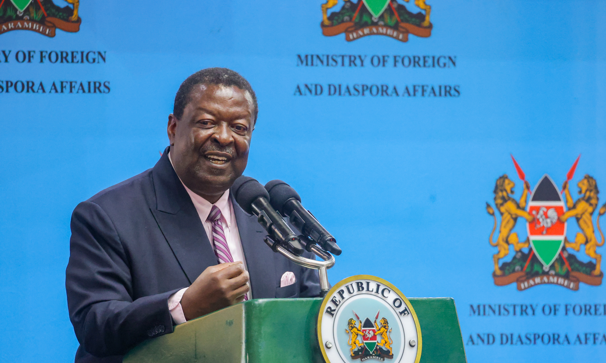

Prime Cabinet Secretary Musalia Mudavadi has issued a stark warning: Africa’s fight against poverty and pursuit of sustainable development are under serious threat from escalating environmental disasters.
“If we don’t act now, shrinking ecosystems will trigger worse water shortages, food insecurity, disease outbreaks and deadly extreme weather,” Mudavadi said.
At the 20th African Ministerial Conference on the Environment (AMCEN), Mudavadi described the global environmental outlook as “deeply troubling.”
“Just four months ago, the World Meteorological Organization confirmed that 2024’s average global temperature has already breached the critical 1.5°C limit since pre-industrial times—a glaring sign that global climate efforts are failing,” he said.
Mudavadi challenged ministers to craft bold, united policies that position Africa as a leader in the fight against environmental collapse.
The AMCEN meeting, underway at UNEP headquarters in Nairobi’s Gigiri, runs through to Friday under the theme, “Four Decades of Environmental Action in Africa: Reflecting on the Past and Imagining the Future.” It also marks AMCEN’s 40th anniversary since its launch in 1985.
Over four decades, AMCEN has been Africa’s frontline forum—shaping regional environmental policies and projecting the continent’s voice on the world stage.
Mudavadi slammed worsening pollution, highlighting UN estimates that nearly one million species face extinction if we fail to curb reckless land, water and energy use—a disaster that will doom 2030 biodiversity targets.
Plastic pollution is choking the planet: UNEP says 7 billion tonnes of plastic waste already fouls ecosystems, with 430 million tonnes produced yearly.
He flagged upcoming global events—COP15 on Wetlands, INC-5.2 on the Global Plastics Treaty, COP30 on Climate Change—as critical battlegrounds to reverse damage.
Mudavadi called for fully consolidating UNEP’s headquarters in Nairobi, a commitment reaffirmed 13 years ago at Rio+20, to boost Africa’s environmental leadership.
Kenya is pushing to host the secretariats of both the Science-Policy Panel and the Global Plastics Treaty at UNEP Nairobi—strengthening the city’s status as a green innovation hub.
“Thanks to collective efforts, UNEP Nairobi is now the interim home of the Science-Policy Panel Secretariat. We urge continued support to make this permanent,” Mudavadi said.
Kenya’s own environmental record shines: over 90 per cent of its energy comes from renewables, and since 2017, it has banned plastic bags nationwide.
“We protect biodiversity fiercely—from national parks to marine reserves—and are championing youth leadership in the environment,” Mudavadi added.
Environment CS Dr Deborah Barasa hailed AMCEN as a powerhouse platform, uniting African nations to shape global environmental policy for 40 years.
“AMCEN has boosted Africa’s clout on climate change, biodiversity, pollution, desertification, and sustainable development,” she said.
Kenya is spearheading nature-based solutions, circular economies and community-driven conservation, backed by robust laws like the Climate Change Act and National Climate Change Action Plan.
Barasa called on AMCEN to become a beacon of African unity, innovation and accountability. “Let it be the platform where youth, women, indigenous peoples, and entrepreneurs define Africa’s environmental future.”
Fred Boltz of the Global Environment Facility highlighted $7.7 billion in GEF funding for Africa since 1991—nearly a third of total funds.
“In the last three years alone, over $1 billion has been approved to help Africa hit its biodiversity goals,” Boltz said.
This funding has fueled the creation of 160+ new protected areas and improved management of 480 sites covering more than 280 million hectares—five times Kenya’s size.
UNEP Deputy Executive Director Elizabeth Mrema praised Africa’s united front in shaping global agreements on biodiversity, climate, chemicals, and waste—proof that together, Africa wields real power.











